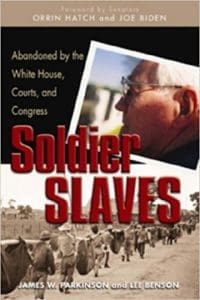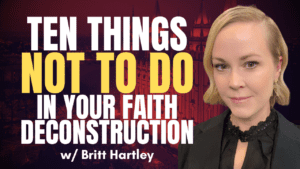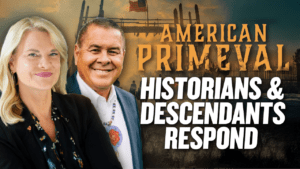
This podcast is a slight divergence from my most recent interviews, but in every way fits the original spirit of Mormon Stories. Within these 3 episodes, we tell the story of Harold Poole–an LDS survivor of one of the most barbaric events in the 20th century–the Bataan Death March. We also discuss in some depth the ethics of law, and the juxtaposition of being LDS and a lawyer.
- Part 1: We meet James W. Parkinson–a high profile personal injury lawyer, and a member of the LDS Church. We discuss Jim’s early years in Indio, CA, his early career as a law student and trial lawyer, his involvement in the “Big Tobacco” settlement, and his introduction to Harold Poole–LDS member and survivor of the Bataan Death March.
- Part 2: Jim tells us the story of Harold Poole–member of the LDS church, and survivor of the Bataan Death March. We discuss in detail how Mr. Poole survived the march, and his subsequent enslavement to a Japanese steel factory.
- Part 3: Jim Parkinson tells us the story of how he and his colleagues initiated a law suit on behalf of the Bataan Death March survivors, and took the case all the way to the U.S. Supreme Court, and then to the U.S. Congress.
For instructions on how to subscribe to this podcast via iTunes, click here.
If you enjoy the podcasts, please consider a book…for yourself, or for a friend and/or loved one. I promise you that the $$$ will go towards a worthy cause.
Part 1
Part 2
Part 3




10 Responses
John, is this Mr. Parkinson any relation?
What a wonderful podcast. I really enjoyed listening to such an articulate lawyer discussing the topic of the Bataan Death March.
Thanks for having such an great guest on your show.
He is my 1st cousin, but we are from different generations. His father is the oldest of 6, my mother is the 2nd youngest of 6, and I am the youngest of my mother\\\’s kids, and he is the 2nd oldest of his parents.
Anyway, I feel pretty lucky to have him on the show. He has been on the front page of the Wall Street Journal, been in USA Today, etc.
Thank you. The best show so far. These heroes should be recorded as they tell their stories. I think of these kinds of things as I hear of the current debates over the use of torture. This story needs to be heard.
Mr. Parkinson helps to point out the good side of being an attorney. I tell the lame jokes too, it was important to hear the other side.
I second Aaron: great podcast, amazing stories, interesting to hear an “atorney’s side” to some issues. I have been recommending this podcast to everyone I know.
Only half way through part 2, but VERY interesting stuff. I must admit, I was a little disappointed at first to hear that a big LDS topic wasn’t going to be discussed, but that soon went away as I listened more to the stories of this very fascinating man and the people he has been involved with.
I’ve listened to all of the Mormon Stories podcasts to date and look forward with great anticipation to what else you have in store for us…
Keep up the great work Mr Dehlin!
Aw shucks, fellas. My cousin will be mighty happy to hear your kind words. Thanks so much. And don’t forget to get purchase a book for yourself or for a loved one if you support the cause. I’m not one to shill….but the book is much more powerful than the interview, and it would be a great present for a grandparent or parent…or youngster for that matter.
I’ll put a link up to make it real easy-like.
Thanks for all the support.
I loved this 3 part series! Thanks for interviewing my Dad. Although I have heard all of those stories before, I never get tired of hearing them because he tells every story like its the first time. I love listening to him, not because he is my Father, but because he is very interesting, articulate and can really make you feel the emotion of a story. I guess you can say he is my Vin Scully and I learned to love language because of him. THANK YOU JOHN- This was GREAT!
I have mixed feelings about this podcast. I know this commentary is late in coming, but I just barely got around to listening to the three part series. Certainly I have a lot of respect for people like Harold Poole and the other survivors of the Bataan death march. What they did in defending the U.S. is admirable. I read about the rescue of the prisoners remaining in the Philippines in a different book a while ago – an amazing story in its own right.
I also respect Mr. Parkinson for having the insight to turn his trial idea into a book (though I haven’t read the book).
That said, I was a little disappointed by some of what came out about the actual trial. It seems to me that Mr. Parkinson is suffering from “one tool syndrome” – Mr. Parkinson is a trial lawyer who litigates. And, as the famous dictum goes, “When all you have is a hammer, everything begins to look like a nail.” I think that is the case here as well. I don’t think this ever should have been turned into a lawsuit. Certainly what was done to U.S. POWs at the hands of the Japanese was reprehensible. I’m not arguing that point. But does Mr. Parkinson also believe in reparations for black slaves in the U.S.? Or does he only believe in reparations for white, U.S. POWs in Japan? That seems like a major double-standard. Additionally, it really seemed to come across as though the lawyers were the ones pushing this lawsuit. As Mr. Parkinson himself said, Harold Poole and the others didn’t want any money – they just wanted people to recognize what happened to them. I won’t go so far as to say that this was just a bunch of greedy lawyers trying to take some money from large Japanese corporations, but it almost started to look that way. I was particularly disturbed when they tried to pass this as legislation that would take money away from U.S. taxpayers to give to people who don’t even want it. How much would the lawyers get from such a piece of legislation? Or are they just interested in the publicity?
Don’t get me wrong – I’d love to see the survivors of the Bataan death march receive some other form of accolade – a monument, a tribute, etc., but why does it have to be in the form of money? Again, if all you have is a hammer, everything looks like a nail. Mr. Parkinson has litigation; everything seems to require litigation.
I don’t want to imply that he was just greedy; I don’t think that is true. But I also don’t think suing Japanese corporations for the actions of the owners of the companies 60 years ago makes much sense. What is the oft-repeated thought by Mormon apologists – don’t judge Joseph Smith by today’s standards (or Brigham Young, in particular)? Isn’t that what Mr. Parkinson is doing? Clearly things have changed in Japanese culture over the last 60 years. Why hold the current companies responsible for the actions of the leadership 60 years earlier? That doesn’t seem very fair… And why isn’t he pushing for reparations for blacks in the U.S. today?
Anyway, I did enjoy the podcast – but mostly for the historical and factual information about the death march, events in the Pacific Theater, and the information about the survivors and the case. I was not all that impressed with Mr. Parkinson’s defense of lawyers, though I see his perspective. I’m not opposed to lawyers to begin with, but actions like his (suing a company for actions 60 years ago) are part of the reason lawyers have a bad name, deserved or not. What good would it have done if they won? The victims didn’t want the money, just an apology. I bet if the lawyers had just sued for an apology (which they would never do; it wouldn’t cover their fees), they would have gotten one. Hell, they would have gotten that through arbitration and wouldn’t have needed lawyers.
Anyway, it was a good podcast but not without its problems.